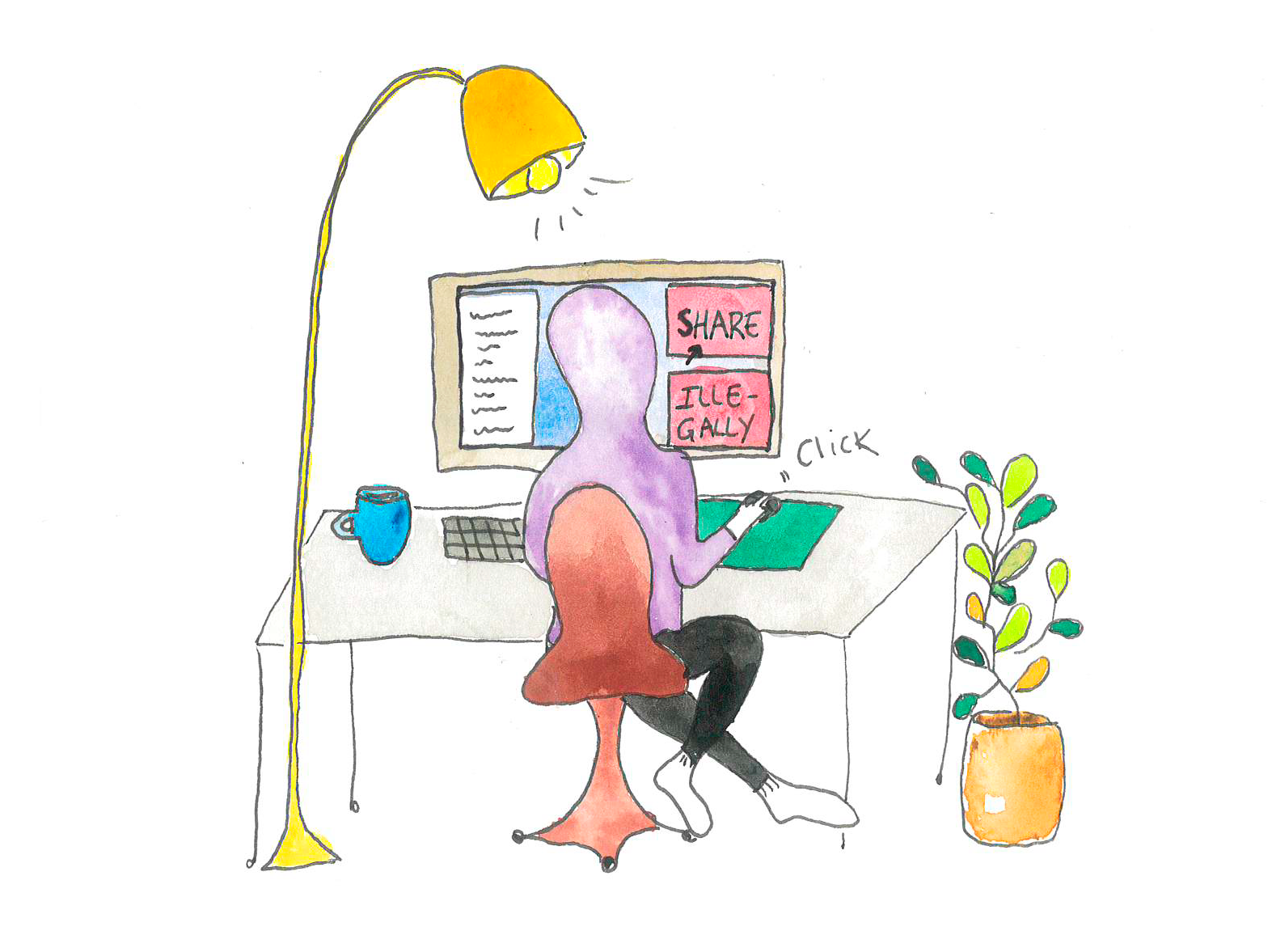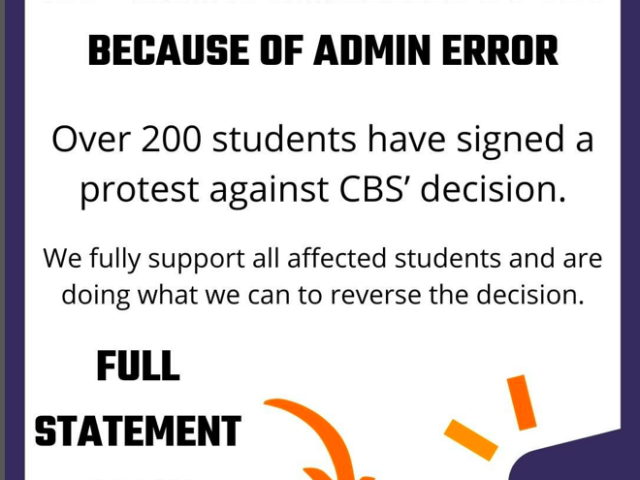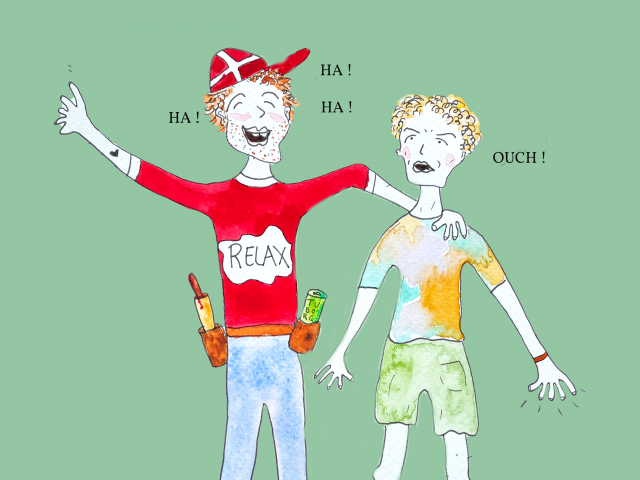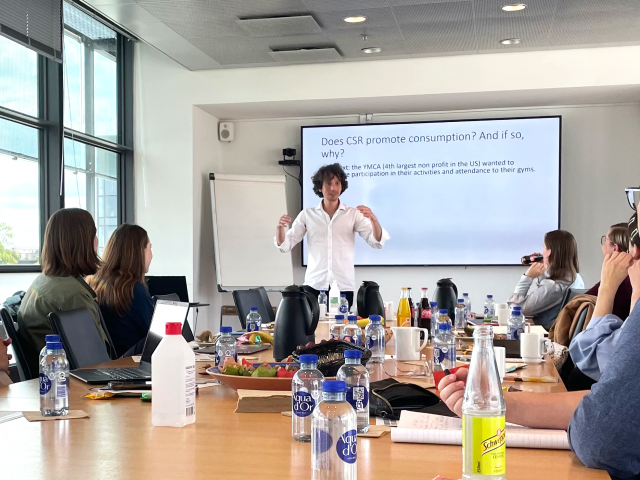Have you ever shared study books with a friend? Then you should definitely think twice

Many students share study books with each other, according to a new survey. But sharing books with your friends is actually illegal. (Illustration: Ida Eriksen)
About half of all students in Denmark have used at least one illegally shared textbook while studying. The majority are obtained from friends or study groups, and many students find this practice acceptable. But when books are illegally shared, writers are not paid, which over the years will mean that fewer textbooks will be written in Danish and about Danish subjects.
If you are like most university students, you will have used at least one digital textbook while studying. And if you have, there is about a 50% chance that the book was obtained illegally.
At least according to a survey by Epinion on behalf of RettighedsAlliancen – a Danish organization dedicated to preventing copying and illegal sharing of books, movies, music, and design products.
They recently highlighted the problem of illegally shared or pirated study books at an event for the publishing industry, professors, librarians, and bookshops.
There, they disclosed that they have talked to professors who teach classes where students are illegally sharing books that the professors have written.
“We have met professors who feel quite helpless about the problem; they want to get paid for the time they have put into writing a book, but they also want their students to be prepared for classes. And to some extent, they experience that if the students can’t obtain the books illegally – and for free – they do not bother and simply attend classes unprepared,” says CEO Maria Fredenslund from RettighedsAlliancen.
Perhaps the obvious solution would be to hand out the textbooks for free, so that students are prepared for classes and no illegal activities take place. But if authors are not paid for the books they write, they will eventually stop writing them. This will ultimately result in fewer textbooks in Danish about Danish society, trade, politics… well, you name it.
“Since Danish is not a widespread language, it is more difficult to earn a decent living as a writer of Danish textbooks. If the writer then loses a lot of income due to pirating, they will, of course, have less incentive to keep writing,” Maria Fredenslund says.
Sharing exam questions
It has not been possible for CBS Wire to determine the extent of the illegal sharing of textbooks at CBS. Yet the problem is something that for example the Department of Accounting at CBS is very attentive to. To make sure that students are aware of the fact that they can’t share study books with each other, they have begun displaying the relevant copyrights on the front page of all exam questions.
This is to ensure that the exam questions are not shared with third parties such as companies offering tutoring seminars. But stating the copyrights is not enough, according to Jeanette Willert. She still feels that students should be further educated on the matter and is saddened that some students would rather spend money on tutoring classes than textbooks.
“If they bought the books and came to classes, they would stand a very good chance of passing the subject with a good grade. When you continually attend classes, you have time to reflect on the material in between classes. It’s not the same if you learn the entire subject matter during a weekend at a tutoring class,” Jeannette Willert explains.
To prevent students from feeling left behind and the need to pay for expensive tutoring classes, CBS has started study cafés.
Students aren’t aware of the negative consequences
Altogether, 32% of the students in the Epinion survey say that they obtained the textbook through a friend or someone in their study group. And 68% of them consider this kind of sharing acceptable.
The response is often positive. Usually, people say that they did not know it was illegal and will stop immediately
Maria Fredenslund, RettighedsAlliancen
“The social acceptance of illegal sharing means that many students inappropriately perceive this as a favor to friends and an easy way to save money. It is therefore crucial that information is supplemented by concrete initiatives to change the norms behind student’s illegal consumption,” says Maria Fredenslund from RettighedsAlliancen.
She feels that the students accept the practice because they are not fully aware of the consequences of illegal sharing.
“This mindset indicates that students do not consider the potential consequences of illegal sharing, both regarding the personal risks of being penalized, but also that it contributes to undermining the economic and professional basis for producing Danish academic literature in the future. Together with institutions, we need to explore this area further to see how we can minimize the damaging practice of illegal sharing,” Maria Fredenslund says.
Watch out for fines
RettighedsAlliancen has seen numerous cases of pirated digital textbooks in recent years. Some cases, where numerous books have been sold or shared, have been reported to the police and in some instances the culprits have been prosecuted. In other cases, the culprits have been let off with fines of DKK 5,000 to 10,000.
Every year in September when the fall term begins, RettighedsAlliancen holds a massive campaign to inform students that sharing digital books is against the law. The initiative is called Os Der Elsker Viden – We Who Love Knowledge – and at CBS, both the student administration and the library participate.
The campaign not only gives students information about what is legal and what is not, RettighedsAlliancen also surveys forums where digital books are often shared illegally. It reaches out to buyers, sellers, and forum administrators to warn them that they are breaking the law.
“The response is often positive. Usually, people say that they did not know it was illegal and will stop immediately,” says Maria Fredenslund from RettighedsAlliancen.
But information campaigns cannot stand alone. The Epinion survey shows that 68% of students know when sharing digital textbooks is legal or illegal – and do it any way.
RettighedsAlliancen therefore works with schoolchildren to educate them on copyright and piracy in the hopes that they will be more conscious of the consequences as adults.






































































































































I know a few post docs who have written text books. They get a couple of hard copies and that’s about it. None I know have made money from them, nor is that the reason they write them. If publishers want to reduce books being copied maybe they should look at reducing some of their shady practices, such as releasing a new version of a text book, that is nearly identical, except for shifting around of page numbers or example questions.